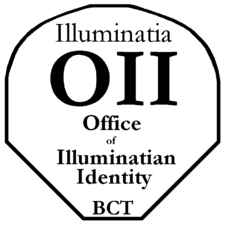Office of Illuminatian Identity
The Illuminatia Office of Illuminatian Identity (OII) is a government office operating within the Illuminatia Bureau of Commerce and Trade (BCT) tasked with managing the commercial usage of identifying marks relating to and representing Illuminatia, the Neonisi planet, and the Lucidus mission. The OII has authorities relating to the establishment and maintenance of intellectual property.
Entities wishing to do business, be it for-profit or non-profit, and wishing to use words, brands, or images that could be perceived as relating to Illuminatia, Neonisi, or the Lucidus mission must first seek permission from the OII to do so. This applies easily to any corporation or organization wishing to use "Illuminatia," "Neonisi," and "Lucidus," or any demonyms or other derivatives or forms of these names, such as "Illuminatia" or "Lucidian." This authority also applies to use of images that represent the shape of the continent, the planet, or the Lucidus mission spacecraft. Any identifying name, image, or logo that could be perceived as representing the Illuminatian continent, its people, the Illuminatian civilization, the Illuminatian cultural, the continent or planet as a geographic entity, or any continent-wide or Lucidus-derived authority is subject to approval for such usage by the OII.
Entities that have received permission for such names include examples such as Illuminatian University of Science and Industry, Illuminatian Academy of Innuendo, organizations related to Lucidian Omniquasitheism, as well as the Lucidian Revolutionary Army. A notable example of an organization that flaunts OII authority is the Illuminatian Liberation Army, which has at no time sought to acquire the necessary rights to adopt the Illuminatian identity in its name.
Despite Illuminatian culture's generally liberal values in relation to intellectual property, regulation of branding and identity to this extent is well-tolerated, as it is understood that improper use of authoritative identifying marks could be misleading, could victimize consumers, and could harbor and encourage fraudulent activities.
